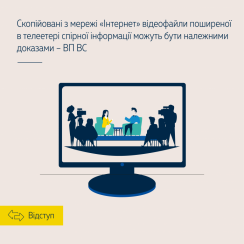Contact center of the Ukrainian Judiciary 044 207-35-46
ABOUT THE SUPREME COURT
FOR CITIZENS
ACTIVITY
PRESS-CENTER

The Grand Chamber of the Supreme Court derogated from the legal conclusion that the proof of dissemination of disputable information by the broadcaster on air is only the original recording of the programme containing the disputable information and / or a copy of the recording of such a programme received by the plaintiff under part 5, Art. 64 of the Law of Ukraine "On Television and Radio Broadcasting".
This is stated in case No. 905/902/20 on the claim of the MU "Centre for the Treatment of Animals" against LLC "Ukraina" TV and Radio Company on recognizing the information disseminated on the air of the TV channel "Donbass" as false and harmful for business reputation, and on refuting the false information. The plaintiff claimed that the information disseminated in the video about a contractual relationship between the MU "Centre for the Treatment of Animals" and the Lyman City Council of the Donetsk Region regarding the provision of services for the catch of stray animals was not true.
The court of first instance satisfied the claims in part, recognized the information disseminated by the defendant to be false and harmful for the plaintiff's business reputation. The court of appeal reversed the decision and dismissed the claim. The Commercial Cassation Court within the Supreme Court referred the case to the Grand Chamber of the Supreme Court.
The SC Grand Chamber pointed to the fact that the legislation in the field of regulating relations involving dissemination of false information through radio and television did not provide that evidence of the dissemination of such information (evidence of broadcasting or rebroadcasting a programme with disputable information by a television and radio organization) could be obtained exclusively in the manner provided for by the Law of Ukraine "On Television and Radio Broadcasting".
The Grand Chamber of the Supreme Court emphasized that in order to achieve the goal of the trial, the plaintiff had the right to provide either a video recording received in accordance with Art. 64 of this Law, or a video recording from an electronic Internet source (electronic platform) on which the video was posted. If a person does not have such a recording and provides a copy obtained from other sources, the court may require a video recording if there is doubt about the compliance of the submitted video with the original (Part 5, Article 96 of the Code of Commercial Procedure of Ukraine). If the video recording has not been preserved at all, the parties have the right to prove the facts of the violated right in the case with any evidence.
The resolution also states that the right to judicial protection of business reputation does not depend on whether a citizen or a legal entity has exercised their right to demand that the broadcaster should refute inaccurate information extrajudicially. Therefore, the expiration of the statutory 14-day period of storage of a broadcast programme and the applicant's failure to apply to a broadcaster during this period with a request to refute false information and / or provide a copy of the programme fragment recording does not deprive him of the opportunity to defend his rights in court in compliance with the principle of adversarial proceedings.
In view of the above, the Grand Chamber of the Supreme Court cancelled the judgment of the court of appeal and remitted the case to the court of appeal for a new hearing.
Resolution of the Grand Chamber of the Supreme Court of December 7, 2021, in case No. 905/902/20 (proceedings No. 12-52ãñ21) – https://reyestr.court.gov.ua/Review/102342551.
This and other legal positions of the Supreme Court can be found in the Database of Legal Positions of the Supreme Court - lpd.court.gov.ua/login.